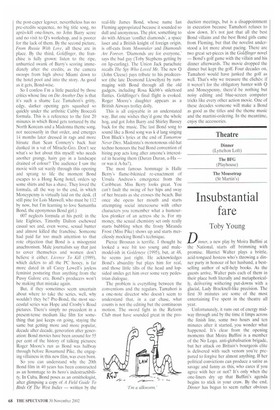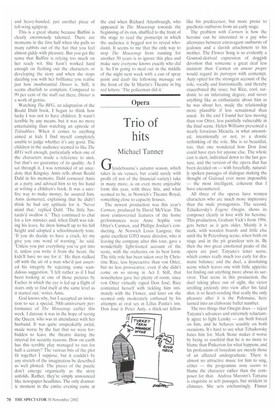Dinner (Lyttelton Loft) The BFG (Playhouse) The Mousetrap (St Martin's)
Insubstantial fare
Toby Young
Dinner, a new play by Moira Buffini at the National, starts off brimming with promise. Harriet Walter plays a brittle, acid-tongued hostess who's throwing a dinner party in honour of her husband, a bestselling author of self-help books. As the guests arrive, Walter puts each of them in their place both literally and metaphorically, delivering withering put-downs with a glacial, Lady Bracknell-like precision. The first 30 minutes are some of the most entertaining I've spent in the theatre all year.
Unfortunately, it runs out of energy midway through and by the time it limps across the finish line, some two hours and ten minutes after it started, you wonder what happened. It's clear from the opening moments that Moira Buffini is a member of the No Logo, anti-globalisation brigade, but her attack on Britain's bourgeois elite is delivered with such venom you're prepared to forgive her almost anything. If her political convictions can produce a satire as savage and funny as this, who cares if you agree with her or not? It's only when the one-liners dry up that Buffini's agenda begins to stick in your craw. By the end, Dinner has begun to seem rather obvious
and heavy-handed, just another piece of left-wing agitprop.
This is a great shame because Buffini is clearly enormously talented. There are moments in the first half when she pulls so many rabbits out of the hat that you feel almost giddy with pleasure. But you get the sense that Buffini is relying too much on her ready wit. She hasn't worked hard enough on fleshing out the characters or developing the story and when she stops dazzling you with her brilliance you realise just how insubstantial Dinner is, Still, it seems churlish to complain. Compared to 99 per cent of the stuff out there. Dinner is a work of genius.
Watching The BFG. an adaptation of the Roald Dahl book, I begun to think how lucky I was not to have children. It wasn't terrible by any means, but it was no more entertaining than watching an episode of Teletubbies. When it comes to anything aimed at kids I find myself completely unable to judge whether it's any good. The children in the audience seemed to like The BEG well enough, particularly when one of the characters made a reference to snot, but that's no guarantee of its quality. As I sat through it, I was reminded of an anecdote that Kingsley Amis tells about Roald Dahl in his memoirs. Dahl cornered Amis at a party and advised him to try his hand at writing a children's book. It was a surefire way to make money, he assured him. Amis demurred, explaining that he didn't think he had any aptitude for it. 'Never mind that,' replied Dahl. The little hastards'd swallow it. They continued to chat for a few minutes and, when Dahl was taking his leave, he drew himself up to his full height and adopted a schoolmasterly tone. 'If you do decide to have a crack, let me give you one word of warning,' he said. 'Unless you put everything you've got into it, unless you write it from the heart, the kids'll have no use for it.' He then stalked off with the air of a man who'd just asserted his integrity by rejecting some scandalous suggestion. 'I felt rather as if I had been looking at one of those pictures by Escher in which the eye is led up a flight of stairs only to find itself at the same level as it started out,' writes Amis.
God knows why, but I accepted an invitation to see a special, 50th-anniversary performance of The Mousetrap earlier this week. I daresay it was in the hope of seeing the Queen, who was in attendance with her husband. It was quite unspeakably awful, made worse by the fact that we were forbidden to leave the theatre during the interval for security reasons. How on earth has this terrible play managed to run for half a century? The various bits of the plot fit together I suppose, but it couldn't by any stretch of the imagination be described as well plotted. The pieces of the puzzle don't emerge organically as the story unfolds, Rather, they're simply announced like newspaper headlines. The only dramatic moment in the entire evening came at
the end when Richard Attenbourgh, who appeared in The Mousetrap towards the beginning of its run, shuffled to the front of the stage to read the postscript in which the audience is begged not to reveal whodunit. It seems to me that the only way to stop The Mousetrap from running for another 50 years is to ignore this plea and make sure everyone knows exactly who did it. So I'm going to steal out in the middle of the night next week with a can of spray paint and daub the following message on the front of the St Martin's Theatre in big red letters: 'The policeman did it.'



























































































 Previous page
Previous page